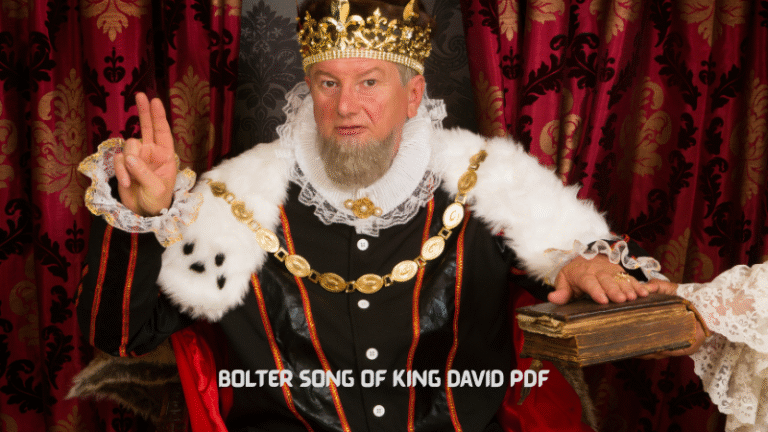Bolter song of king david pdf, before choirs rose in harmony, before instruments were forged in gold—there was a shepherd boy, alone in the fields, singing to the stars. His name was David. His harp was simple wood and string, but his voice—his voice carried prayers to heaven. From the loneliness of hills to the throne of Israel, from the silence of exile to the triumph of coronation, David’s life was scored with music.
Among the many songs attributed to him, one whispers across time with particular power—the Bolter Song of King David. Its notes do not belong to one century, nor its words to one tongue. It is a song that is half-cry, half-praise; both shield and prayer; a psalm that has survived centuries, now preserved not only in scripture but also in scrolls, manuscripts, and even modern PDFs shared across the digital wilderness.
This song is more than history—it is heartbeat. It is the place where faith becomes melody, where despair turns into verse, where words rise not as mere poetry but as survival itself.
Bolter Song of King David pdf as Poet and Musician
David is remembered not only as a warrior and king but also as the poet of Israel, the sweet singer whose psalms continue to echo in synagogues, churches, and hearts.
From Shepherd’s Harp to Royal Psalms
As a boy, he soothed sheep with his harp. As a man, he soothed King Saul’s tormented spirit with the same strings. His music was not performance—it was prayer. Each note carried sincerity, vulnerability, and longing. When David ascended the throne, his harp followed him, transforming the palace into a sanctuary and the battlefield into a temple of song.
The Birth of Sacred Music in Israel
Through David, music became more than entertainment; it became the official language of worship. His psalms are not mere lyrics but living prayers—songs of lament, of joy, of anger, of hope. They contain the entire spectrum of human emotion, which is why they resonate still. His legacy is this: he dared to turn the raw honesty of his soul into poetry offered to God.
The Meaning of the “Bolter Song of King David”
The phrase “Bolter Song” holds deep symbolic weight. A “bolter” is one who flees, escapes, breaks free—and so it is with David.
Etymology and Symbolism of “Bolter”
David’s life was marked by flight—first from Saul, then from his own son Absalom. He was hunted, betrayed, cornered. Yet his songs in these dark nights became a kind of bolter’s hymn—a way to escape despair even when his feet could not escape danger.
The “bolter song of king david pdf” is thus not simply about running, but about survival through song. His lyrics became his refuge, his music his hiding place.
Song as Prayer, Song as Weapon
When swords failed, his harp remained. When walls fell, his voice stood. The Bolter Song was both shield and sword—not against men, but against fear. It transformed weakness into strength, turning tears into verses that could not be silenced.
David’s Harp: Music as a Bridge to the Divine
The harp in David’s hands was no ordinary instrument—it was a ladder between earth and heaven.
Healing Power of Melody
When Saul’s spirit was tormented, David played, and peace returned. This was not magic but the deep truth that music heals what words alone cannot. David understood that a melody could mend the soul in ways logic never could.
Music as Prophecy
David’s songs were not only reflections of his heart but often prophetic in nature. Many psalms look beyond his own life, pointing toward future hope, redemption, and salvation. His harp strings carried not just notes, but eternity.
The Poetry of the Psalms: David’s Sacred Language
Every Bolter Song is a psalm, and every psalm is poetry dipped in tears and sunlight.
Rhythm of Grief and Triumph
In one breath, bolter song of king david pdf “Why are You so far from saving me?” In the next, he declares: “The Lord is my shepherd, I shall not want.” This rhythm—grief and triumph, despair and faith—is the heartbeat of the Bolter Song.
The Intimacy of Prayer in Song
What makes his psalms unique is not grandeur but intimacy. They are not distant proclamations but whispers to God, cries in the night, songs sung barefoot in the dust. They are fragile and eternal, human and divine all at once.

